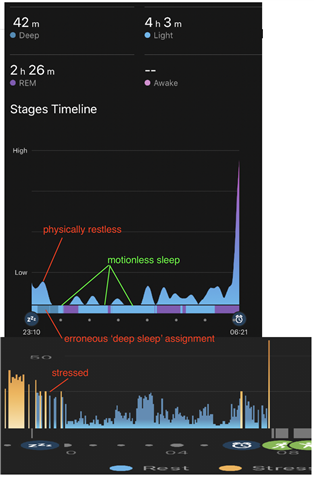(Just an extra effort to get noticed)
Dear Garmin
Please improve your sleep assessment algorithms. I believe the current software is meeting its supplied specification, but the results are not useful.
(1) '8 hours of sleep' is not a useful goal for all individuals, particularly across age groups. One treatment for insomnia is sleep restriction, in which the individual limits sleep hours to determine a period without wakefulness. In my case this is probably between 7.25 and 7.5 hours, and achieving the green tick mark for 8 hours indicates that I am 'out of sorts' - I recovered from an earlier lack of sleep, and on subsequent nights I may sleep poorly due to oversleeping on the 'successful' night.
Suggestions: Starting from a default of 8 hours, (a) Allow a manual setting for the target number of sleep hours; (b) Make the setting a range to encourage consistent sleep habits instead of weekend recovery patterns; (c) Offer automatic adjustment which would estimate the individual's target sleep hours based on weeks/months of collected data.
(2) The current algorithm appears to apply a model of 'deep sleep' occurring within the first few hours of going to bed, however in the example provided below it is not sufficiently weighting data from the motion and/or heart rate sensors. This is not the worst example I have seen, merely the recent one which spurred making the complaint. In this case I knew that I had a hard time falling asleep due to worrying about something, and my next day exercise performance was impaired more than I expected.
Suggestions: (a) Fix the system so that it does not identify 'deep sleep' when the user is stressed and fitful; while an EEG might have confirmed delta waves in the period highlighted, the current result does not provide useful information to help predict my performance or moderate my effort. (b) Provide stress / heart rate / HRV data on the sleep timeline as I have pasted together here; offer this together (not a choice between motion or stress overlays) to improve the richness of the sleep data presentation. (c) My own experience and comments on forums have suggested to me that the total hours of 'motionless sleep' as noted on the figure correlates well with my sense of fatigue or 'restedness' the following day; please provide this value on devices with heart rate sensors, ideally with an optional threshold for what is counted as 'motionless'. (c) Even better (I suspect), provide a counter for sleep time that is 'low motion and low stress' - and probably this is where I would most benefit from the tick mark indicating successful sleep.
I understand that the current sleep stages results are based on research by FirstBeat, and further that motion is inhibited in healthy individuals while dreaming. For developing my own fitness however, I do not need an estimate of brain wave state (which I do not believe is currently working anyway). Instead, I am looking for more information to help decide between 'can push harder' and 'maintain effort but avoid injury'.
Thank you.



